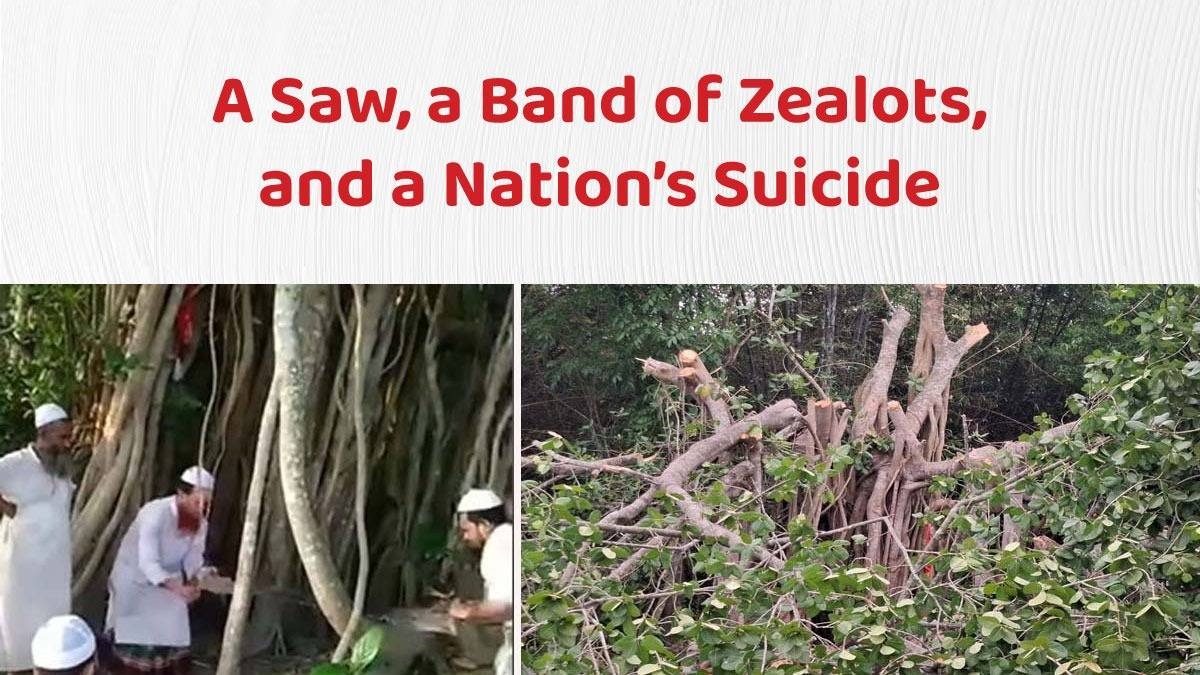In Alom Mir’s Kandi village of Madaripur, a century-old banyan tree has been cut down — in the name of religion. Worship rituals, vows, Baul songs, and Boishakhi fairs held under the tree were deemed evidence of wrongdoing. As a result, a group indoctrinated with Islamic jihadi ideology arrived with a saw and felled the tree. The administration remained asleep then, and now claims to be investigating. This is not an isolated act of savagery — it is part of a broader fundamentalist land-grab strategy operating under the protection of Yunus. Having captured state power, they are now claiming nature, culture, faith, and civic consciousness.
Cutting down a tree doesn’t just mean the death of a plant — it’s a strangling of local biodiversity. For a century, that banyan tree had not only provided shade but had also been home to birds, bats, insects, and a refuge for river-dwelling people. To destroy it is to deal a fatal blow to an entire ecosystem. More than that, it sends a terrifying message: in this country, even nature isn’t safe if it’s tied to what they deem a ‘criminal’ belief — in this case, different faiths, customs, worship, or cultural practices.
This incident is part of a carefully orchestrated campaign of cultural erasure. Where once Baishakhi fairs and Baul music flourished beneath the banyan tree, there now echoes fatwas against ‘shirk’ and ‘bidaat’. The once-vibrant, diverse rural festivals are now seen as ‘haram’ by the flag-bearers of rigid religiosity. No stage, no song, no spiritual celebration is safe anymore if it emerges from the heart of Bengali culture. This violent cultural opposition speaks an age-old language — where a Hindu at a village fair is deemed ‘kafir’, and a woman singing a folk song is condemned to hell.
What’s most alarming is that these acts are unfolding with the silent approval — and at times, active encouragement — of the state. The Islamist fundamentalist structure built under Yunus has now reached a point where they are judge and executioner. Trees are being cut down, doctors are being assaulted in the streets, fairs are being canceled — all based on mere suspicion, fanaticism, and political patronage, with no investigation or evidence.
The felling of the banyan tree isn’t just a one-off; it’s another episode in an ongoing assault. Disruptions of Hindu religious festivals, attacks on cultural gatherings — they are all part of the same ideology-driven force led by the same regime, one that wears the face of a state but dreams of a Taliban-like theocracy. Their goal is to turn Bangladesh’s rich pluralism into a one-track, one-faith authoritarian state.
Bangladesh now stands at a crossroads where there is no real difference between cutting down a tree and dragging a girl by her hair through the streets. Both acts stem from the same enemy — a fanatical structure that is slowly suffocating nature, religious minorities, and culture. In cutting down the tree, they didn’t just take away a home for birds — they stole the ground from beneath people’s feet. To them, this lifeless, peaceful, sacred tree was the greatest threat — because it symbolized tolerance, tradition, and life itself.
The death of this tree reflects the death of democracy on August 5, 2024 — in a Bangladesh where there is no faith, no conscience, no environment, and now, no Bangla either.





